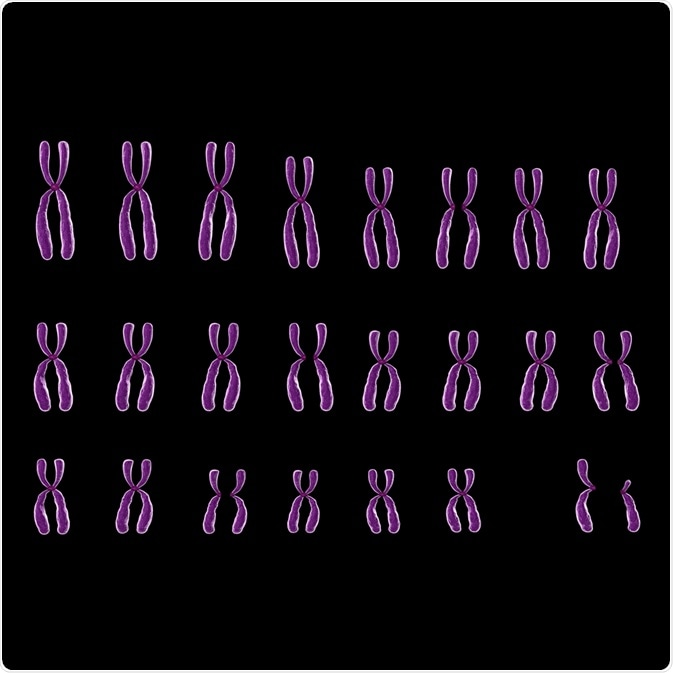Cytogenetics is the study of chromosomes, a vital tool to understanding how genetics play a role in the development and progression of certain diseases, as well as to predicting how a person will respond to particular therapeutics. It has become an indispensable tool for cancer diagnostics and is predicted to be fundamental to advancing the fields of drug discovery and personalized medicine.
 Image Credit: sciencepics/Shutterstock.com
Image Credit: sciencepics/Shutterstock.com
The origins of molecular genetics
The classical use of the term cytogenetics emerged to describe the structure of the chromosome and determine how abnormalities are linked with disease. Samples of blood, tissue, or bone marrow can be studied with cytogenetics to identify changes in the chromosomes, such as broken, deleted, additional, or rearranged chromosomes.
While chromosomes play a fundamental role in biology, interest in studying them did not peak until the 1960s when scientists discovered that Down syndrome is caused by a chromosomal defect. This sparked scientists’ interest in discovering more about how chromosomes can influence disease. Since the 1960s, cytogenetic studies have uncovered a number of diseases and conditions that are linked with changes to certain chromosomes. Cytogenetics is now relied upon to help doctors perform diagnoses, plan treatment, or assess the efficacy of treatment.
Cytogenetics has evolved in its meaning since the classical use of its term. Now, modern science uses the term cytogenetics (or molecular cytogenetics) to describe the use of techniques that study the chromosome, such as comparative genomic hybridization (CGH), fluorescence in situ hybridization (FISH), and multicolor FISH. Molecular cytogenetics also covers a range of applications, including in vivo imaging, microarrays, nanobiotechnology, real-time polymerase chain reaction (PCR), and single molecule detection.
FISH
Of all the technologies used in cytogenetics, FISH is considered to be the most important. Recent years have seen numerous innovations in the development of traditional FISH technology, the most significant being the establishment of single copy FISH, in vivo FISH (imaging of nucleic acids in living cells) and nanotechnology-based FISH. PNA-FISH has also been developed, particularly for use in the diagnosis of infections. Peptide nucleic acid (PNA) allows for nucleic acid molecules to be targeted more efficiently and rapidly in comparison with DNA probes.
Cytogenetics and cancer diagnosis
Cytogenetics has become particularly important in the development of accurate diagnostic tools for cancer. Traditional karyotyping methods are limited in detecting the cytogenetic aberrations linked with certain cancers as they are sometimes not sensitive enough to detect these changes. Recent developments in molecular cytogenetics technology have allowed conventional banding which produces black and white images to be converted into color.
FISH is now an invaluable tool to both clinical research in the field of oncology, as well as the development of diagnostic tools for leukemia and various cancers. FISH can effectively distinguish chromosomal abnormalities linked with cancer via fluorescent labeled DNA probes.
FISH-based tests, including comparative genomic hybridization (CGH), array CGH, and multicolor karyotyping are now commonplace in various clinical applications due to their capability of visualizing complex karyotypic aberrations as well as performing whole global scanning of genomic imbalances. Cross-species array CGH analysis is also emerging as a key technology, with recent work using this method to identify genes linked with specific cancers.
FISH has had a monumental impact on the diagnosis and prognosis of hematological diseases and cancer. It also plays a vital role in informing therapeutic decisions. FISH will likely facilitate the future development of personalized medicine for these diseases, which will discuss in further detail below.
Cytogenetics and the development personalized medicine and drug discovery
Personalized medicine, also referred to as precision medicine, is the result of the newly discovered relationship between genomics and drug discovery. Understanding how genomics impacts disease allows scientists to select more precise molecules as potential drug candidates to treat a disease at the level of the individual or community.
Cytogenetic techniques offer a window into the underlying mechanisms and potential therapeutic avenues to explore for different diseases. It is vital to advancing the field of personalized medicine, by allowing doctors to have access to richer levels of clinical information to be leveraged when creating disease management plans.
To date, oncology is the field of medicine that has benefitted the most from cytogenetics in terms of leveraging this discipline into precision medicine. Already, cytogenetic research has succeeded in establishing targeted treatments and immunotherapies for a range of cancers.
Cytogenetics is being used to inform drug discovery for a range of diseases. Research has already yielded a range of potential therapeutic targets, and work has advanced particularly rapidly in the field of Mendelian diseases. Precision therapies for a number of conditions, including cystic fibrosis, lysosomal storage disorders, spinal muscular atrophy, and tuberous sclerosis are already clinically available.
Currently, it is uncertain how, or if, cytogenetics will be able to develop precision medicine options for all diseases. It is predicted that some conditions, with a stronger genetic basis, will be the first to benefit. But as research continues, it is possible that genomic precision medicine approaches will become more generalizable.
References:
- Ferguson-Smith, M., 2008. Cytogenetics and the evolution of medical genetics. Genetics in Medicine, 10(8), pp.553-559. https://www.nature.com/articles/gim200885
- Tsien, F., 2020. Cytogenetics in precision medicine. Clinical Precision Medicine, pp.1-10. https://www.sciencedirect.com/science/article/pii/B978012819834600001X
- Wan, T. and Ma, E., 2012. Molecular cytogenetics : an indispensable tool for cancer diagnosis. Biomedical Journal, 35(2), p.96. https://pubmed.ncbi.nlm.nih.gov/22537925/
- Wang, N., 2002. Methodologies in cancer cytogenetics and molecular cytogenetics. American Journal of Medical Genetics, 115(3), pp.118-124. https://pubmed.ncbi.nlm.nih.gov/12407691/
Further Reading
Last Updated: Oct 4, 2021